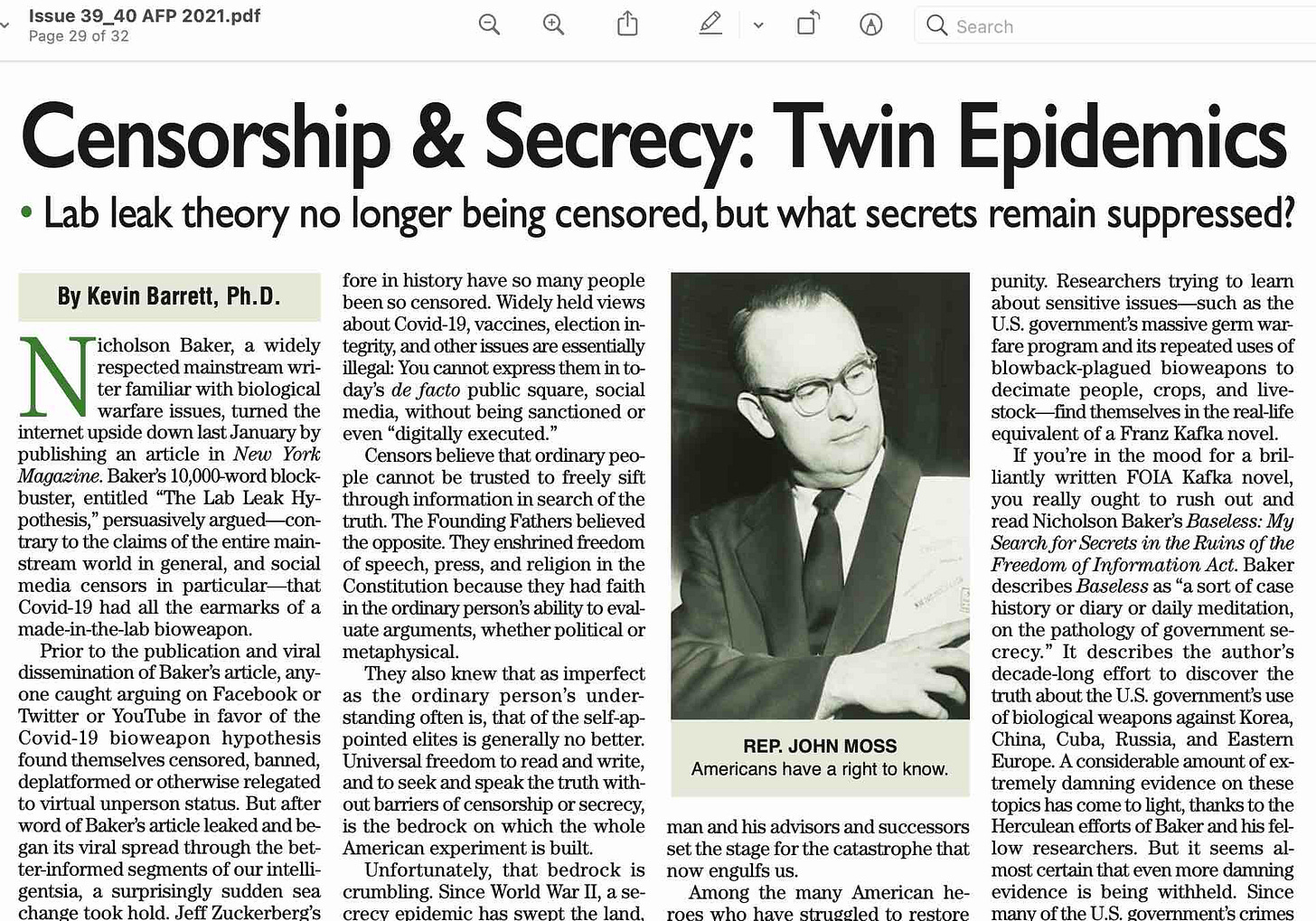Censorship and Secrecy
Twin Epidemics Killing America
Here’s my latest for AFP, posted here for my Substack subscribers only. -KB
By Kevin Barrett, for American Free Press
Nicholson Baker, a widely respected mainstream writer familiar with biological warfare issues, turned the internet upside down last January by publishing an article in New York Magazine. Baker’s 10,000-word blockbuster, entitled “The Lab Leak Hypothesis,” persuasively argued—contrary to the claims of the entire mainstream world in general, and social media censors in particular—that COVID-19 had all the earmarks of a made-in-the-lab bioweapon.
Prior to the publication and viral dissemination of Baker’s article, anyone caught arguing on Facebook or Twitter or YouTube in favor of the COVID-19 bioweapon hypothesis found themselves censored, banned, deplatformed, or otherwise relegated to virtual unperson status. But after word of Baker’s article leaked and began its viral spread through the better-informed segments of our intelligentsia a surprisingly sudden sea change took hold. Zuckerberg’s minions announced that Facebook would no longer censor arguments for the lab origin of COVID, and other social media outfits likewise loosened their policies—and, presumably, their algorithms.
We must applaud the end of this particular episode of censorship. But it should never have happened in the first place. The notion that Americans are gullible, innocent children whose tender eyes should not be exposed to certain kinds of information is, of course, profoundly un-American. Unfortunately, that un-American approach now rules America. Never before in history have so many people been so censored. Widely-held views about COVID-19, vaccines, election integrity, and other issues are essentially illegal: You cannot express them in today’s de facto public square, social media, without being sanctioned or even “digitally executed.”
Censors believe that ordinary people cannot be trusted to freely sift through information in search of the truth. The Founding Fathers believed the opposite. They enshrined freedom of speech, press, and religion in the Constitution because they had faith in the ordinary person’s ability to evaluate arguments, whether political or metaphysical. They also knew that as imperfect as the ordinary person’s understanding often is, that of the self-appointed elites is generally no better. Universal freedom to read and write, and to seek and speak the truth without barriers of censorship or secrecy, is the bedrock on which the whole American experiment is built.
Unfortunately, that bedrock is crumbling. Since World War II, a secrecy epidemic has swept the land, poisoning public discourse and encouraging the institutionalization of catastrophic pestilential evil. The world we inhabit today—hobbled by literal plague as well as the even worse metaphorical plague of fractiousness and exponentially-increasing well-founded mistrust of all of our institutions—is the product of our elites’ post-World War II decision to stop trusting the American people. By entering a state of permanent war, and using it to justify their new national security state in which critically-important information is systematically withheld from the public, Truman and his advisors and successors set the stage for the catastrophe that now engulfs us.
Among the many American heroes who have struggled to restore the Republic and its commitment to freedom, openness, and transparency, one of most important yet unsung is Congressman John Moss, prime mover behind the 1966 Freedom of Information Act. That law, informally known by its acronym FOIA, legally enshrined the principle that the people have the right to know everything their government is doing, and can ask for and receive a copy of any government document, any time, with only strictly limited exceptions.
Unfortunately, ever since FOIA was passed, government gatekeepers have been flouting the law with impunity. Researchers trying to learn about sensitive issues—such as the US government’s massive germ warfare program and its repeated uses of blowback-plagued bioweapons to decimate people, crops, and livestock—find themselves in the real-life equivalent of a Franz Kafka novel.
If you’re in the mood for a brilliantly-written FOIA Kafka novel, you really ought to rush out and read Nicholson Baker’s Baseless: My Search for Secrets in the Ruins of the Freedom of Information Act. Baker describes Baseless as “a sort of case history, or diary, or daily meditation, on the pathology of government secrecy.” It describes the author’s decade-long effort to discover the truth about the US government’s use of biological weapons against Korea, China, Cuba, Russia, and Eastern Europe. A considerable amount of extremely damning evidence on these topics has come to light, thanks to the Herculean efforts of Baker and his fellow researchers. But it seems almost certain that even more damning evidence is being withheld. Since many of the US government crimes in question happened more than 50 years ago, it’s obvious that the pretext for withholding key documents, “national security,” is a sham. The terrible truth is that our rulers are afraid to let us see slam-dunk proof that the institutions by which they rule us have descended into sheer, psychopathic evil and outright insanity.


We turn to you Kevin when looking for truth in journalism. May God be with you.